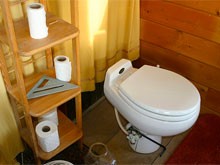YES! But How? Composting Toilets
I’ve read that composting human waste is much more environmentally friendly than disposing of it in water-based sewage systems. Could I install a composting toilet in my home?
.
Posted 14 July 2011, by Oliver Lazenby, Yes!, yesmagazine.org
.
Standard water-based sewage systems account for about 30 percent of household water use: Even low-flow toilets use 1.6 gallons of water with each flush.
Composting toilets don’t use water and are odor-free and sanitary if maintained properly. In a matter of months, they break human waste down into unobjectionable compost. Municipal planning authorities across the country are coming around to the idea that composting toilets are not only better for the environment, but safe for public health, too.
One example comes from a private elementary school in Seattle with 233 students. The Bertschi School’s new science wing is designed to be completely self-sufficient, which includes composting human waste. A vacuum flushes the toilet into two composting tanks, which can hold a total of six months’ worth of waste. Janitors dump bark dust into the tanks to add carbon to the mixture, and slide a handle in and out to aerate.
Composting toilets can cost more than $1,000 at home stores, but the Humanure Handbook says you can do it yourself. Mount a toilet seat atop a 5-gallon bucket. Use sawdust to cover your “business,” eliminate odor, and encourage the composting process. Use undyed, unscented toilet paper. Add the results to the rest of your compost, making sure it’s safe from flies, rodents, and the like. Some people empty the bucket into a container like a 55-gallon drum.
This only works with a well-tended compost pile that gets hot enough to kill any pathogens. Experts recommend composting for a year to add a margin of safety, since common germs and parasites don’t survive that long in soil.
The result will make great compost for trees, flowers, fruits, and fruiting vegetables, although cautious gardeners avoid using it on root crops. Contact your County Health Department to find out the regulations about composting toilets in your area.
Oliver Lazenby wrote this article for Beyond Prisons, the Summer 2011 issue of YES! Magazine. Oliver is an editorial intern at YES!
Interested?
- The Humanure Handbook, now in its 3rd edition, is a detailed source on the biology of composting human manure.
- More YES! But How?
If you’re looking for practical ways to live sustainably, just ask us. - Ditch the Fridge
It’s time for me to replace my refrigerator and I was wondering if I really need another as big as the last. I’d like to downsize or be rid of it altogether.
.
http://www.yesmagazine.org/issues/beyond-prisons/yes-but-how-composting-toilets
